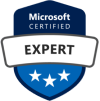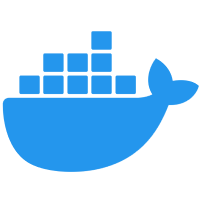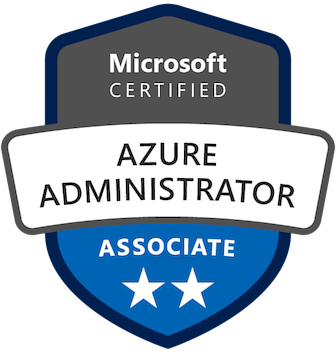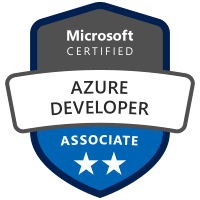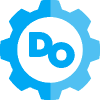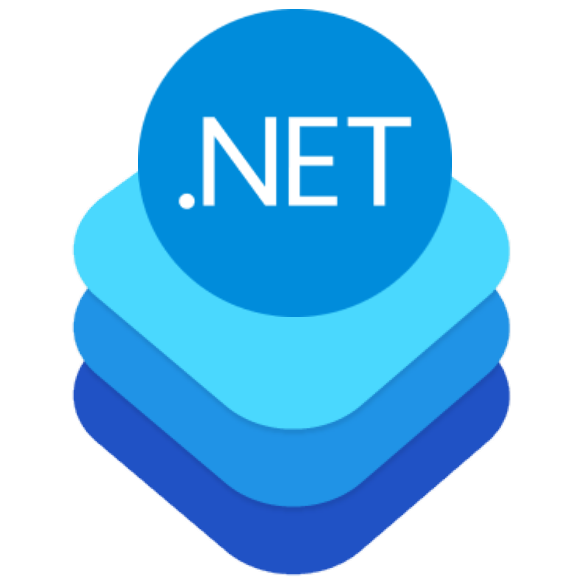Is a DevOps Career Right for You in 2025?
Is a Career in DevOps the Right Fit for You in 2025?
DevOpseliminates roadblocks between development and operations teams and improves teamwork. It also automates procedures to deliver software more reliably and efficiently. There are plenty of opportunities and excitement in this dynamic sector. Are you prepared to adopt a constant learning culture? Do you enjoy the concept of automating processes to make things flow more smoothly and do well in fast-paced environments? If the response is yes, then DevOps might be your ideal career choice!
Butthere are a few important factors to consider, whether you're new to the IT industry or an experienced developer seeking a change. So, in thisDevOps Tutorial, we will analyze whether the DevOps profile is the right fit for you by reviewingits skills, responsibilities, and other factors.
What is DevOps?
- DevOps is Development and Operations Collaboration,
- It’s a Union of processes, People, and Working products that enable continuous integration and continuous delivery of value to our end users.
- DevOps accelerates the process to deliver applications and software services at high speed and high velocity.
- So that organizations can learn and adapt to the market as soon as possible.
- It also minimizes the risk factor by continuously delivering and obtaining feedback from end-users and stakeholders at the early stages.
- The intense peer relationship between the words 'Dev' and 'Ops' defines every two phases of the DevOps lifecycle.
- Starting from the initial software analysis & planning to define the codebase, building the application, end-to-end testing, and product release phases, and on to deployment, operations, and ongoing software monitoring.
- The combination of the two propels the seamless, continuous customer feedback loop for continuous improvement, development, testing, and application deployment.
- The end result of these improvement efforts can be the highly rapid, continual release of necessary feature changes or additions based on the business aspects and the overall success of the client product.
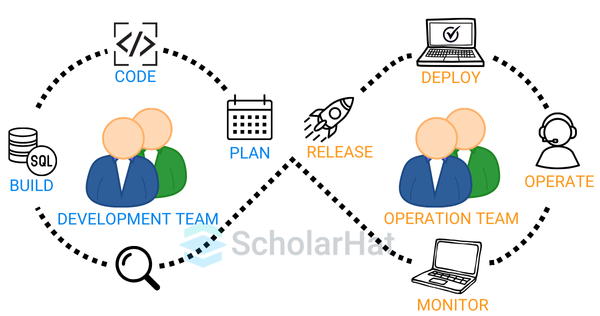
| What is DevOps and how does it work? |
Why DevOps is a Good Career in 2025
With the rise of automation, cloud computing, and continuous delivery, DevOps has become one of the most in-demand and future-proof career paths in technology. Here is why choosing a DevOps career in 2025 is a smart decision:
1. High Demand Across Industries
Organizations in finance, healthcare, e-commerce, education, and more are adopting DevOps practices. DevOps engineers consistently rank among the top tech jobs on job platforms like LinkedIn, Glassdoor, and Indeed.
2. Excellent Salary Packages
Due to their combined expertise in coding, cloud, automation, and CI/CD, DevOps professionals command high salaries.
- India: ₹10 to ₹25 LPA
- US: $110,000 to $160,000 annually
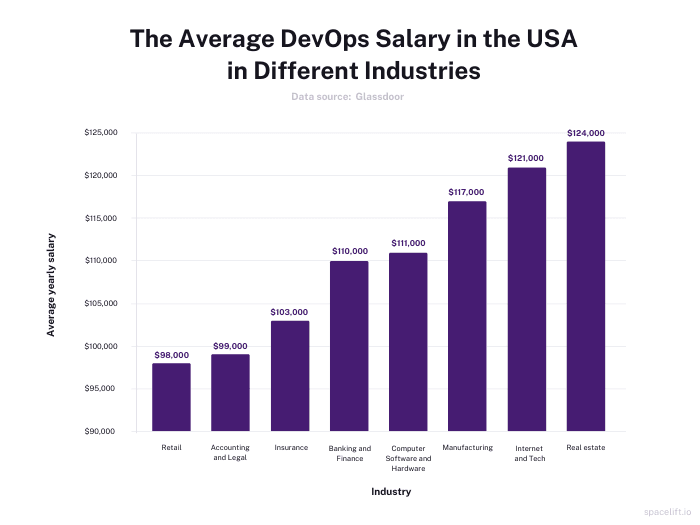
3. Cloud-First World Needs DevOps
As businesses move toward cloud-native and multi-cloud strategies, DevOps is essential for efficiently deploying and managing applications on platforms like AWS, Azure, and Google Cloud.
4. Bridge Between Development and Operations
DevOps professionals eliminate silos between dev and ops teams, enabling faster releases, better quality software, and improved customer satisfaction.
5. Challenging and Versatile Role
DevOps roles involve working with a wide range of tools and domains such as:
- CI/CD (e.g., Jenkins, GitHub Actions)
- Containerization (e.g., Docker, Kubernetes)
- Infrastructure as Code (e.g., Terraform, Ansible)
- Cloud monitoring and security tools
6. Integral to Secure Software Delivery
In 2025, the demand for DevSecOps professionals is growing. These roles integrate security throughout the software development lifecycle and help organizations deliver secure software by design.
7. Career Growth and Leadership Opportunities
DevOps roles offer strong career progression. You can grow into positions such as:
- Site Reliability Engineer (SRE)
- Cloud Architect
- DevOps Manager
- Platform Engineer
- Chief Technology Officer (CTO) in startups
8. Remote and Global Opportunities
Many DevOps jobs are remote-friendly, giving professionals access to global job markets. Freelancers and consultants in DevOps are also in high demand worldwide.
Who is a DevOps Engineer?
- A DevOps Engineer uses those set of practices, principles, and cultural philosophies in real time to improve collaboration among development, operations, and other teams.
- The roles and responsibilities of a DevOps Engineer are to combinesoftware development and IT operations skills to efficiently communicate and smoothly carry out theSoftware Development Life Cycle.
Essential Skills for a DevOps Career
Technical Skills for a DevOps Engineer
First of all, we will go through some of the technical skills that are important for the role of a DevOps Engineer:
1. Coding and Scripting
- A DevOps engineer needs to be proficient in at least one programming language, such as Python, Ruby, or Java.
- They must be experienced in using scripting languages like Shel, PowerShell, or Bash.
- It helps them in automating tasks and developing infrastructure as code.
2. Linux Fundamentals
- DevOps environments use Linux as their operating system a lot.
- So it is better to have a deep understanding of Linux Fundamentals that will help in managing servers and environments.
- It is important as most servers and cloud environments run on Linux.
3. Infrastructure Management
- Infrastructure Management is also essential like provisioning, configuring, and managing infrastructure resources.
- Some key tools are Terraform, Ansible, Puppet, and Chef.
- It provides consistency in infrastructure deployments.
4. System Administration
- System Administration is required for the smooth operation of the system and applications.
- It involves tasks like server management, network configuration, and system monitoring and troubleshooting.
5. DevOps Toolchains
- For automation and orchestration of CI/CD pipelines, it is important to have experience with DevOps toolchains.
- DevOps Toolchains are a set of tools like Jenkins, GitLab CI/CD CircleCI, and Travis CI, that are used for development, testing, deployment, and monitoring.
6. Cloud Computing
- Cloud Computing is a must to know if you want to become a skilled DevOps Engineer.
- It involves delivering computing services over the internet like infrastructure, platforms, and software.
- You must have a basic knowledge of platforms such as AWS, Azure, and Google Cloud.
- It helps in making the infrastructure and services more scalable and flexible.
7. Database and Network Management
- It involves the skills in managing databases and networking configurations.
- Proper database and network management makes sure that data integrity and smooth communication between systems is maintained.
8. Testing, Security, and Monitoring
- It is better to know how to implement testing practices, security measures and monitor systems.
- So that the quality of the software and system health can be maintained and there is protection against threats.
9. Automation
- Automation is of high importance in DevOps.
- It lets you automate tasks and processes with the help of scripts or tools.
- Automation helps in improving proficiency, and it also reduces errors.
10. Software Testing
- Testing software for bugs, performance issues, or any other kinds of issues makes sure that the software releases are reliable and that their quality is assured.
11. Computer Programming
- The skill of computer programming gives you the ability to write, understand, and debug code so that you have a good foundation in automating tasks and developing software.
12. Security
- One of the most important aspects that makes you a skilled DevOps developer is security.
- You should be able to implement security measures that will protect the systems and data against cyber threats and also ensure that the security standards are met.
13. Configuration Management
- An understanding of tools like Ansible, Puppet, or Chef is preferred for managing and maintaining system configurations.
14. Source Code Management
- Tools like Git help in managing and versioning source code.
- These are helpful to have as skills for smooth collaboration, version control, etc.
15. Continuous Delivery
- Automation of processes where delivery code changes to production helps enable faster and more frequent deployments.
- It also reduces the risks involved.
Read More: Continuous Delivery vs Continuous Deployment
Soft Skills for DevOps Engineer
Soft skills are also as important as the technical skills. They promote smooth collaboration and effective outcomes. Some of them are discussed below:
16. Interpersonal Skills
- DevOps is all about collaboration, so to become a skilled DevOps Engineer.
- It is important to be able to interact, communicate, and build relationships with the team members and stakeholders.
17. Agile Methodologies
- An understanding and practice of Agile principles and methodologies such as Scrum and Kanban are helpful for the teams to adapt to changes quickly so they can improve simultaneously.
Read More: How do Agile and DevOps interrelate?
18. Organizational Skills
- Organizational skills are equally important whether it's any workplace.
- It is always best to be able to manage tasks, prioritize work, and meet deadlines.
- The same is true with DevOps, it helps in the timely delivery of tasks and projects and the smooth execution of projects.
19. Collaboration
- Being a DevOps Engineer, you need to work in teams.
- Working effectively with others with the same goals improves teamwork and promotes collective problem-solving.
20. Communication
- It is important to know how to convey ideas clearly and give or receive feedback through both verbal and written means.
21. Customer-Focused Approach
- A DevOps engineer must work with a customer-focused approach while making decisions and delivering solutions.
- This makes sure that the customer's needs and expectations are met.
22. Proactive Problem Solving
- The ability to address issues before they get any bigger and find solutions to them helps in maintaining the efficiency of the system.
23. Decision-Making
- Good and timely decision-making based on available resources and information helps in problem solving ensuring the success of the project you are working on.
24. Documentation and Knowledge Sharing
- It is important to be skilled in documenting processes, and procedures for consistency in projects.
- Also sharing them within the team promotes continuous learning.
25. Continuous Learning and Adaptability
- Whether it be any workplace your willingness to learn new technologies will never you outdated.
- A DevOps Engineer must be adaptive to new changes and improve their skills accordingly to stay updated with the latest trends and technologies
| DevOps Engineer Skills |
Roles and Responsibilities of a DevOps Engineer
Roles of DevOps
The above DevOps Engineer description is usually divided into various roles which are documented below:
- DevOps Evangelist
- Release Manager
- Automation Architect
- Developers
- Experience Assurance Professionals (XAs)
- Security Engineer
- Utility Technology Player
Responsibilities of a DevOps Engineer
Responsibilities of a DevOps Engineer vary as per the roles:
1.) DevOps Evangelist
- He/she is the one who plans and ideates the whole practice and processes.
- He/she is the one who owns the DevOps culture in an organization.
- DevOps Evangelist is the leader of the transition to DevOps.
- He/she makes sure that the IT professionals are getting trained properly to bring the DevOps culture into the organization.
- He/she evaluates the whole scenario, prepares a practical plan, and executes it.
- He/she shouldn’t be afraid to fail, fail and learn should be the mantra.
2.) Release Manager
- He/she manages the DevOps product end to end.
- He/she is responsible for the product right from development to production.
- This role is slightly different than a traditional project manager.
- It’s more on the technical side.
- Release managers supervise and oversee the end-to-end delivery.
- They are involved in every phase: coordination, integration, development, testing, deployment, and delivery.
3.) Automation Architect
- It’s an extremely vital role because systems rely heavily on automation in a DevOps culture.
- He/she analyses designs and implements strategies for continuous automated deployments.
- He/she is also known as Integration Specialist.
4.) Developers/Testers
- Developers are the heart and soul of a DevOps practice.
- The term may be the same as that of traditional approaches but the responsibilities have dramatically increased.
- Initially, they used to only replicate the client’s requirements via code and provide a build for the QAs to test.
- But in a DevOps practice, the developer is expected to code, unit test, deploy, and monitor the application.
- Since the duo of a developer and tester is expected to produce magic, the role of a tester is also enhanced dramatically in a DevOps scenario.
- DevOps is referred to as DevTestOps as well, to indicate the importance of testers.
- The onus is on automated testing in a fast-paced environment, so that the quality of the product remains intact.
5.) Experience Assurance Professionals (XAs)
- The existing QA roles have been upgraded.
- The XA professional is expected to test the features and functionalities keeping in mind the end-user experience.
6.) Security Engineer
- They work along with the developer providing their deep-dived recommendation on security.
- As compared to the waterfall methodology of product/service delivery where insecurity used to be really an end thing to ponder, a DevOps project keeps security at par with any other factor, and hence the security engineer’s responsibility increases manifold.
6.) Utility Technology Player
- These people are a rare breed, they can work and operate over-development platforms, tools, networks, servers, databases, and even development and support.
| Roles and Responsibilities of a DevOps Engineer |
Knowledge of major DevOps Tools
There are many DevOps Tools today in the market; there’s no need to master them all, but there’s a need to know a few and understand them deeply.
1. Source Control Management
- It is also known as SCM, a DevOps Engineer is expected to be aware of GIT and GIT workflows.
- The concepts of branches, merge, rebase, pull requests, push, commit, tags, etc., are quite important.
- GIT commands play a vital role in mastering a GIT workflow, in places where there’s no tool and just a plain old terminal.
2. Continuous Integration
- It is also known as CI. CI is the process of automation code integrations from different developers or contributors into a single entity or build.
- A CI process often includes restoring, building, and code analysis steps.
- Jenkins, Azure Pipelines, TeamCity, Travis CI, and CircleCI are a few popular tools available.
3. Configuration Management
- It is also known as Infrastructure Management.
- CM is the process of automating, managing, and monitoring changes across servers, networks, storage, etc.
- Ansible, Puppet, and Chef are a few popular tools available.
4. Deployment Automation
- This is the process of automating the deployment after the CI process creates a build.
- Jenkins, Azure Pipelines, and Octopus Deploy are a few popular tools available.
5. Containerization
- It is the process of operating system virtualization in which different applications are executed in their isolated spaces called containers. Dockers and Kubernetes are a few popular tools available.
6. Cloud Platforms
- Knowledge of a cloud platform is mandatory for a DevOps engineer.
- AWS, Azure, and GCP are the most popular cloud platforms available.
7. Work Tracking
- For work tracking JIRA and Azure Boards are the most popular tools available.
8. Artifact Management
Artifactory and Azure Artifacts are the most popular tools available.

Read More: Top 17 DevOps Tools You Must Know
DevOps Engineer Job Description
Let us have a look at a DevOps Engineer job description from a job portal and see what skills are required. It will validate the skills which we have discussed above. Below is the JD of a DevOps Engineer requirement at Ericsson, the JD has been pulled from Glassdoor, the URL being:
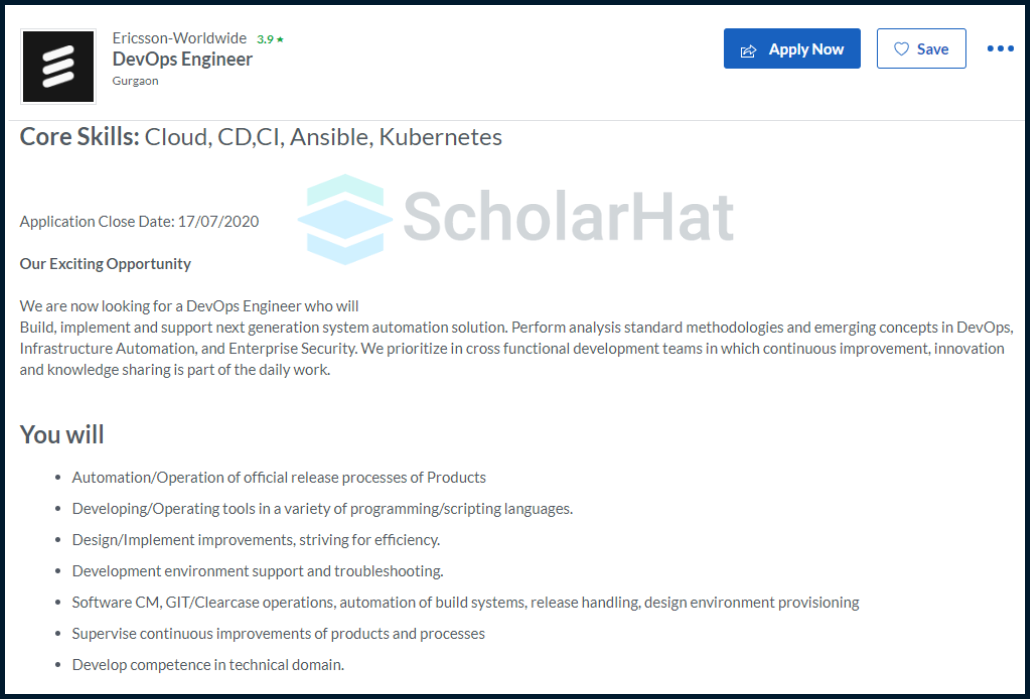
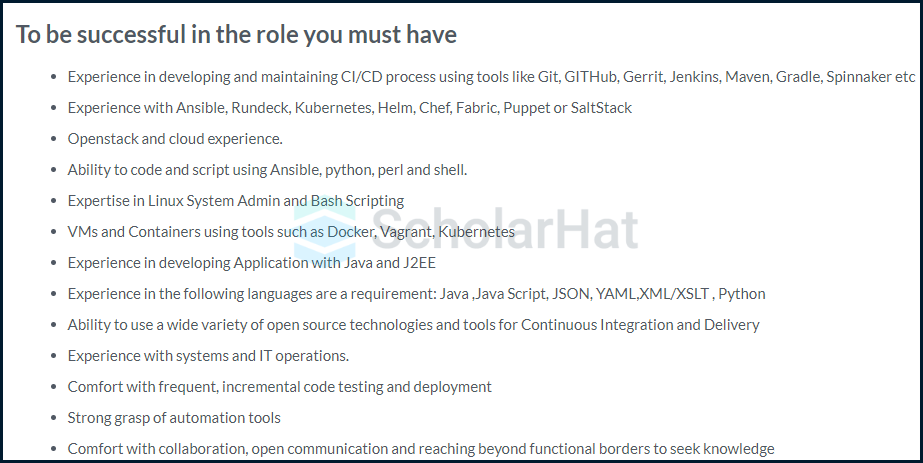
DevOps Career Path
There has been a significant growth in organizations opting for DevOps practices. A career in DevOps can be a rewarding one acknowledging the increase in demand for DevOps professionals. The DevOps career path grows from entry-level roles to more advanced and specialized positions. Let us guide you on the various job positions in the path of DevOps as a career with their basic responsibilities:
1. Entry-Level Positions
DevOps Intern/Junior DevOps Engineer
- Assistance in infrastructure provisioning and management.
- Contribution to CI/CD pipeline setup maintenance.
- To experience working with tools like Docker, Jenkins, and Terraform.
2. Mid-Level Positions
DevOps Engineer
- Management of cloud infrastructure.
- Developing and maintaining CI/CD pipelines.
- Containerization and orchestration with tools like Docker and Kubernetes.
- Monitoring and troubleshooting infrastructure.
3. Senior-Level Positions
Senior DevOps Engineer/DevOps Architect
- Designing efficient infrastructure solutions.
- Leading and mentoring junior DevOps Engineers.
- Collaborating with cross-functional teams.
- Implementation of advanced CI/CD strategies and automation frameworks.
- Enhancing security and compliance.
4. Specialized Roles
DevOps Security Engineer
- Implementation of security best practices.
- Vulnerability assessments and penetration testing.
- Adhering to compliance with industry regulations.
- Collaboration with DevOps and security teams.
DevOps Data Engineer
- Data management, analytics, and visualization.
- Implementation of data pipelines and ETL processes.
- Collaboration with data scientists and analysts to get data insights.
DevOps Engineer Salary
- The demand for DevOps Engineers is currently super high. And depending on the skills they possess, the DevOps Engineer's salary may differ accordingly.
- According to PayScale, the average salary of a DevOps Engineer in India is INR 763,544 per annum.
- Based on Experience, the salary for an entry-level DevOps Engineer role in India is INR 3, 66,337 per year, INR 11, 42,206 per year for mid-level.
- And, for experienced DevOps engineers, it goes up to 16, 32, and 155 per year.
- Based on skills, possessing Python programming skills can get you INR 7, 23,000 per year
Where to Begin Your Journey in DevOps?
Start by:
- Learning programming languages and scripting.
- Building experience with cloud platforms and automation tools.
- Pursuing certifications.
- Engaging with the DevOps community through forums and local meetups.
| DevOps Roadmap to Become a DevOps Engineer |
Conclusion
A career in DevOps in 2025 presents prospects for individuals, with the merging of development and operations work.If you have the abilities and attitude, you can excel in this changing industry. Think about your passions, the skills needed, and the workplace atmosphere to decide if pursuing DevOps aligns with your goals. If you want to start your journey to become a DevOps expert, we recommend enrolling in anAzure DevOps Certification Course.
| Interview Preparation |
| DevOps Interview Guide: Essential Q&A for (Beginner to Advanced) |
FAQs
Take our Devops skill challenge to evaluate yourself!

In less than 5 minutes, with our skill challenge, you can identify your knowledge gaps and strengths in a given skill.



